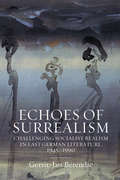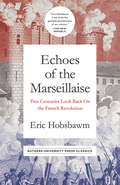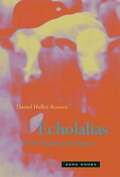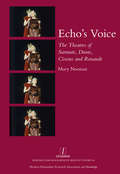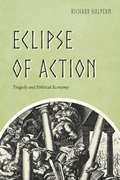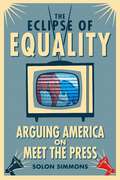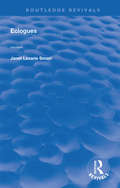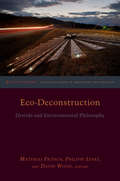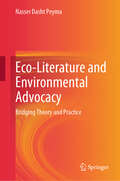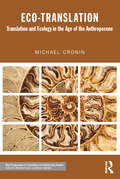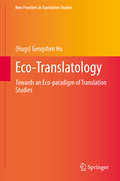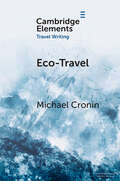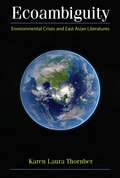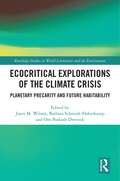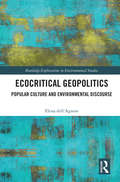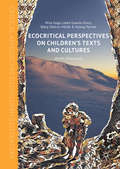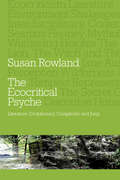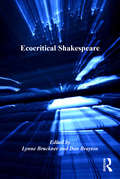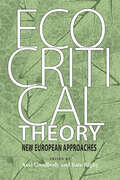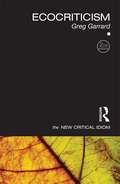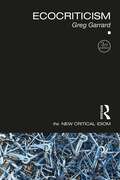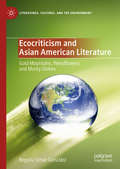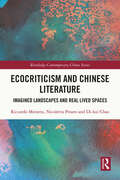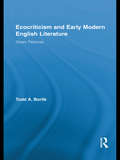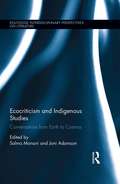- Table View
- List View
Echoes of Surrealism: Challenging Socialist Realism in East German Literature, 1945–1990
by Gerrit-Jan BerendseFor many artists and intellectuals in East Germany, daily life had an undeniably surreal aspect, from the numbing repetition of Communist Party jargon to the fear and paranoia engendered by the Stasi. Echoes of Surrealism surveys the ways in which a sense of the surreal infused literature and art across the lifespan of the GDR, focusing on individual authors, visual artists, directors, musicians, and other figures who have employed surrealist techniques in their work. It provides a new framework for understanding East German culture, exploring aesthetic practices that offered an alternative to rigid government policies and questioned and confronted the status quo.
Echoes of the Marseillaise: Two Centuries Look Back on the French Revolution (Mason Welch Gross Lecture Series)
by Eric HobsbawmWhat was the French Revolution? Was it the triumph of Enlightenment humanist principles, or a violent reign of terror? Did it empower the common man, or just the bourgeoisie? And was it a turning point in world history, or a mere anomaly? E.J. Hobsbawm’s classic historiographic study—written at the very moment when a new set of revolutions swept through the Eastern Bloc and brought down the Iron Curtain—explores how the French Revolution was perceived over the following two centuries. He traces how the French Revolution became integral to nineteenth-century political discourse, when everyone from bourgeois liberals to radical socialists cited these historical events, even as they disagreed on what their meaning. And he considers why references to the French Revolution continued to inflame passions into the twentieth century, as a rhetorical touchstone for communist revolutionaries and as a boogeyman for social conservatives. Echoes of the Marseillaise is a stimulating examination of how the same events have been reimagined by different generations and factions to serve various political agendas. It will give readers a new appreciation for how the French Revolution not only made history, but also shaped our fundamental notions about history itself.
Echolalias: On the Forgetting ff Language
by Daniel Heller-RoazenJust as speech can be acquired, so can it be lost. Individuals can forget words, phrases, even entire languages, and over the course of time speaking communities, too, let go of the tongues that were once theirs, as languages grow obsolescent and give way to others. In Echolalias, Daniel Heller-Roazen reflects on the many forms of linguistic forgetfulness. <p><p>In twenty-one concise chapters, he moves among classical, medieval, and modern culture, exploring the interrelations of speech, writing, memory, and oblivion. Whether the subject is medieval literature or modern fiction, classical Arabic poetry or the birth of French language, structuralist linguistics or Freud’s writings on aphasia, Heller-Roazen considers with precision and insight the forms, effects, and ultimate consequences of the persistence and disappearance of language. <p><p>In speech, he argues, destruction and construction often prove inseparable. Among speaking communities, the vanishing of one language can mark the emergence of another, and among individuals, the experience of the passing of speech can lie at the origin of literary, philosophical, and artistic creation. <p><p>From the infant’s prattle to the legacy of Babel, from the holy tongues of Judaism and Islam to the concept of the dead language and the political significance of exiled and endangered languages today, Echolalias traces an elegant, erudite, and original philosophical itinerary, inviting us to reflect in a new way on the nature of the speaking animal who forgets.
Echo's Voice: The Theatres of Sarraute, Duras, Cixous and Renaude
by Mary NoonanHelene Cixous (1937-), distinguished not least as a playwright herself, told Le Monde in 1977 that she no longer went to the theatre: it presented women only as reflections of men, used for their visual effect. The theatre she wanted would stress the auditory, giving voice to ways of being that had previously been silenced. She was by no means alone in this. Cixous's plays, along with those of Nathalie Sarraute (1900-99), Marguerite Duras (1914-96), and Noelle Renaude (1949-), among others, have proved potent in drawing participants into a dynamic 'space of the voice'. If, as psychoanalysis suggests, voice represents a transitional condition between body and language, such plays may draw their audiences in to understandings previously never spoken. In this ground-breaking study, Noonan explores the rich possibilities of this new audio-vocal form of theatre, and what it can reveal of the auditory self.
Eclipse of Action: Tragedy and Political Economy
by Richard HalpernAccording to traditional accounts, the history of tragedy is itself tragic: following a miraculous birth in fifth-century Athens and a brilliant resurgence in the early modern period, tragic drama then falls into a marked decline. While disputing the notion that tragedy has died, this wide-ranging study argues that it faces an unprecedented challenge in modern times from an unexpected quarter: political economy. Since Aristotle, tragedy has been seen as uniquely exhibiting the importance of action for human happiness. Beginning with Adam Smith, however, political economy has claimed that the source of happiness is primarily production. Eclipse of Action examines the tense relations between action and production, doing and making, in playwrights from Aeschylus, Marlowe, Shakespeare, and Milton to Beckett, Arthur Miller, and Sarah Kane. Richard Halpern places these figures in conversation with works by Aristotle, Smith, Hegel, Marx, Hannah Arendt, Georges Bataille, and others in order to trace the long history of the ways in which economic thought and tragic drama interact.
The Eclipse of Equality: Arguing America on Meet the Press
by Solon SimmonsRed state vs. blue state. Republican vs. Democrat. Fox News vs. The Daily Show. The so-called culture wars have become such a fixture of American politics that dividing the country into rival camps seems natural and political gridlock seems inevitable. Entering the fray, Solon Simmons offers an intriguing twist on the debate: Our disagreements come not from unbridgeable divides, but from differing interpretations of a single underlying American tradition—liberalism. Both champions of traditional liberal values, Republicans have become the party of individual freedom while Democrats wear the mantle of tolerance. Lost in this battle of sides is the third pillar of liberalism—equality. Simmons charts the course of American politics through the episodes ofMeet the Press. On the air since 1945,Meet the Pressprovides an unparalleled record of living conversation about the most pressing issues of the day. In weekly discussions, the people who directly influenced policy and held the reins of power in Washington set the political agenda for the country. Listening to what these people had to say—and importantly how they said it—Meet the Pressopens a window on how our political parties have become so divided and how notions of equality were lost in the process. Telling the story of the American Century, Simmons investigates four themes that have defined politics and, in turn, debate onMeet the Press—war and foreign affairs, debt and taxation, race struggles, and class and labor relations—and demonstrates how political leaders have transformed these important political issues into symbolic pawns as each party advocates for their own understanding of liberty, whether freedom or tolerance. Ultimately, withThe Eclipse of Equality, he looks to bring back to the debate the question lurking in the shadows—how can we ensure the protection of a peaceful civil society and equality for all?
Eclogues (Routledge Revivals)
by Boccaccio GiovanniOriginally translated and published in 1987, this volume contains a full text and translation of Giovanni Boccaccio's Eclogues, alongside textual and historical notes including an explanation of Boccaccio's life, his artistic achievement, and the sources and influences.
Eco-Deconstruction: Derrida and Environmental Philosophy (Groundworks: Ecological Issues in Philosophy and Theology)
by Matthias Fritsch Philippe Lynes David Wood Karen Barad Timothy Clark Claire Colebrook Vicki Kirby John Llewelyn Michael Marder Dawne McCance Michael Naas Kelly Oliver Michael Peterson Ted Toadvine Cary WolfeEco-Deconstruction: Derrida and Environmental Philosophy launches a new mode of philosophical and ethical reflection with respect to the challenges posed by the degradation of the natural environment, including habitat loss, species extinction, and climate change. While the work of French philosopher Jacques Derrida (1930-2004), with its relentless interrogation of the anthropocentric metaphysics of presence, has already proven highly influential in posthumanism and animal studies, the present volume, drawing on published and unpublished work by Derrida and others, builds on these insights in addressing and responding to the most pressing environmental issues of our time. The volume brings together 15 scholars, many of which have achieved world renown, from a wide variety of related fields, including eco-phenomenology, eco-hermeneutics, new materialism, posthumanism, animal studies, vegetal philosophy, science and technology studies, environmental humanities, eco-criticism, earth art and aesthetics, and analytic environmental ethics. Overall, eco-deconstruction offers an account of differential relationality explored in a non-final, non-totalizable ecological context, both quasi-ontologically and quasi-normatively, with attention to diagnosing our times. Accordingly, the book is divided into four sections—Diagnosing the Present, which suggests that our times are marked by a facile, flattened-out understanding of time and thus in need of deconstructive dispositions; Ecologies, which mobilizes the spectral ontology of deconstruction to argue for an originary environmentality, the constitutive ecological embeddedness of mortal life; Nuclear and Other Biodegradabilities, in which contributors reflect on the remains, by-products, and disintegrations of human culture, including nuclear waste, environmental destruction, and species extinctions; and Environmental Ethics, which seeks to uncover a demand for justice, including human responsibility for suffering beings, that emerges precisely as a response to original differentiation, and the mortality and unmasterable alterity it installs in living beings. As such, the book may resonate with readers not only in philosophy, but across the humanities and the social and natural sciences.
Eco-Literature and Environmental Advocacy: Bridging Theory and Practice
by Nasser Dasht PeymaThis book offers a comprehensive exploration of the power of eco-literature to inspire environmental activism and ethical stewardship. It uniquely blends literary analysis, environmental advocacy, and interdisciplinary perspectives to showcase how literature serves as a catalyst for global change. By integrating poetry, visual arts, and storytelling, the book provides readers with a unique, multidimensional approach to understanding the environmental crisis. It stands out for its global and cultural scope, drawing on Indigenous narratives and cross-cultural perspectives. It weaves together the works of eco-literary pioneers like Thoreau, Muir, and Leopold with contemporary authors such as Amitav Ghosh and Margaret Atwood. The book&’s case studies offer practical insights into how eco-literature has influenced policy and activism, making it both an intellectual resource and a guide for real-world impact. Through practical case studies, it offers insights into how eco-literature influences policy and activism, making it an essential resource for scholars, activists, and students. It serves as a bridge between academic theory and practical application. A valuable book for those interested in the intersection of literature, culture, and environmental justice, providing the tools needed to foster a more sustainable and ethical world.
Eco-Translation: Translation and Ecology in the Age of the Anthropocene (New Perspectives in Translation and Interpreting Studies)
by Michael CroninEcology has become a central question governing the survival and sustainability of human societies, cultures and languages. In this timely study, Michael Cronin investigates how the perspective of the Anthropocene, or the effect of humans on the global environment, has profound implications for the way translation is considered in the past, present and future. Starting with a deep history of translation and ranging from food ecology to inter-species translation and green translation technology, this thought-provoking book offers a challenging and ultimately hopeful perspective on how translation can play a vital role in the future survival of the planet.
Eco-Translatology: Towards an Eco-paradigm of Translation Studies (New Frontiers in Translation Studies)
by (Hugs) Gengshen HuThis book offers a panoramic view of the emerging eco-paradigm of Translation Studies, known as Eco-Translatology, and presents a systematic study of the theoretical discourse from ecological perspectives in the field of Translation Studies. Eco-Translatology describes and interprets translation activities in terms of the ecological principles of Eco-holism, traditional Eastern eco-wisdom, and ‘Translation as Adaptation and Selection’. Further, Eco-Translatology approaches the phenomenon of translation as a broadly conceived eco-system in which the ideas of ‘Translation as Adaptation and Selection’, as well as translation as a ‘textual transplant’ promoting an ‘eco-balance’, are integrated into an all-encompassing vision. Lastly, Eco-Translatology reinforces contextual uniqueness, emphasizing the deep embeddedness of texts, translations, and the human agents involved in their production and reception in their own habitus. It is particularly encouraging, in this increasingly globalised world, to see a new paradigm sourced from East Asian traditions but with universal appeal and applications, and which adds to the diversity and plurality of global Translation Studies. This book, the first of its kind, will substantially expand the horizons of Translation Studies, a field that is still trying to define its own borders, and will open a wealth of new possibilities. Destined to become a milestone in the field of Translation, Interpretation and Adaptation Studies, as well as eco-criticism, it will introduce readers to a wholly new epistemological intervention in Translation Studies and therefore will open new vistas of thoughts, discussion and criticism.
Eco-Travel: Journeying in the Age of the Anthropocene (Elements in Travel Writing)
by Michael CroninHuman encounters with the natural world are inseparable from the history of travel. Nature, as fearsome obstacle, a wonder to behold or a source of therapeutic refuge, is bound up with the story of human mobility. Stories of this mobility give readers a sense of the diversity of the natural world, how they might interpret and respond to it and how human preoccupations are a help or a hindrance in maintaining bio-cultural diversity. Travel writing has constantly shaped how humans view the environment from foreign adventures to flight-shaming. If much of modern travel writing has been based on ready access to environmentally damaging forms of transport how do travel writers deal with a practice that is destroying the world they claim to cherish? This Element explores human travel encounters with the environment over the centuries and asks, what is the future for travel writing in the age of the Anthropocene?
Ecoambiguity: Environmental Crises and East Asian Literatures
by Karen Laura ThornberEast Asian literatures are famous for celebrating the beauties of nature and depicting people as intimately connected with the natural world. But in fact, because the region has a long history of transforming and exploiting nature, much of the fiction and poetry in the Chinese, Japanese, and Korean languages portrays people as damaging everything from small woodlands to the entire planet. These texts seldom talk about environmental crises straightforwardly. Instead, like much creative writing on degraded ecosystems, they highlight what Karen Laura Thornber callsecoambiguity--the complex, contradictory interactions between people and the nonhuman environment. Ecoambiguityis the first book in any language to analyze Chinese, Japanese, Korean, and Taiwanese literary treatments of damaged ecosystems. Thornber closely examines East Asian creative portrayals of inconsistent human attitudes, behaviors, and information concerning the environment and takes up texts by East Asians who have been translated and celebrated around the world, including Gao Xingjian, Ishimure Michiko, Jiang Rong, and Ko Un, as well as fiction and poetry by authors little known even in their homelands. Ecoambiguityaddresses such environmental crises as deforesting, damming, pollution, overpopulation, species eradication, climate change, and nuclear apocalypse. This book opens new portals of inquiry in both East Asian literatures and ecocriticism (literature and environment studies), as well as in comparative and world literature.
Ecocritical Explorations of the Climate Crisis: Planetary Precarity and Future Habitability (Routledge Studies in World Literatures and the Environment)
by Janet M. Wilson Barbara Schmidt-Haberkamp Om Prakash DwivediEcocritical Explorations of the Climate Crisis expands postcolonial precarity studies by addressing the current climate crisis and threats to the habitability of the planet from a range of ecocritical and environmental perspectives. The collection uses planetary thought-action praxis that acknowledges the interconnectedness of all forms of life in addressing the socioecological issues facing humanity: accelerating climate change, over-exploitation of natural resources, and the Global North–South divide. With reference to contemporary cultural productions, such praxis seeks to examine the ideas, images, and narratives that either represent or impede potential disasters like the so-called sixth extinction of the planet, that inspire the dismantling of carbon democracies arising in the wake of neoliberalism, and that address rising inequality with precarious conditions in the transition to renewable energy. The different chapters explore literary and visual representations of planetary precarity, identifying crisis-responsive genres and cultural formats, and assessing approaches to environment-re/making that call for repair, recovery and sustainability. In imagining future habitability, they deploy diverse critical frameworks such as queer utopias, zero-waste lifestyles, alternative ecologies, and adaptations to the uninhabitable. The collection tackles problems of global vulnerability and examines precarity as a condition of resilience and resistance through collective actions and solidarities and innovative constructions of the planet’s survival as a shared home. It engages with current postcolonial debates, uses intersectional methodologies, and introduces contemporary literary, visual concepts, and narrative types.
Ecocritical Geopolitics: Popular culture and environmental discourse (Routledge Explorations in Environmental Studies)
by Elena dell'AgneseWhat is the role of popular culture in shaping our discourse about the multifaceted system of material things, subjects and causal agents that we call "environment"? Ecocritical Geopolitics offers a new theoretical perspective and approach to the analysis of environmental discourse in popular culture. It combines ecocriticial and critical geopolitical approaches to explore three main themes: dystopian visions, the relationship between the human, post-human, and "nature" and speciesism and carnism. The importance of popular culture in the construction of geopolitical discourse is widely recognized. From ecocriticism, we also appreciate that literature, cinema, or theatre can offer a mirror of what the individual author wants to communicate about the relationship between the human being and what can be defined as non-human. This book provides an analysis of environmental discourses with the theoretical tools of critical geopolitics and the analytical methodology of ecocriticism. It develops and disseminates a new scientific approach, defined as "ecocritical geopolitics", to offer an idea of the power of popular culture in the realization of environmental discourse. Referencing sources as diverse as The Road, The Shape of Water, Lady and the Tramp, and TV cooking shows, this book will be of great interest to students and scholars of geography, environmental studies, film studies, and environmental humanities.
Ecocritical Perspectives on Children's Texts and Cultures: Nordic Dialogues (Critical Approaches to Children's Literature)
by Nina Goga Lykke Guanio-Uluru Bjørg Oddrun Hallås Aslaug NyrnesThis volume presents key contributions to the study of ecocriticism in Nordic children’s and YA literary and cultural texts, in dialogue with international classics. It investigates the extent to which texts for children and young adults reflect current environmental concerns. The chapters are grouped into five thematic areas: Ethics and Aesthetics, Landscape, Vegetal, Animal, and Human, and together they explore Nordic representations and a Nordic conception, or feeling, of nature. The textual analyses are complemented with the lived experiences of outdoor learning practices in preschools and schools captured through children’s own statements. The volume highlights the growing influence of posthumanist theory and the continuing traces of anthropocentric concerns within contemporary children’s literature and culture, and a non-dualistic understanding of nature-culture interaction is reflected in the conceptual tool of the volume: The Nature in Culture Matrix.
The Ecocritical Psyche: Literature, Evolutionary Complexity and Jung
by Susan RowlandThe Ecocritical Psyche unites literary studies, ecocriticism, Jungian ideas, mythology and complexity evolution theory for the first time, developing the aesthetic aspect of psychology and science as deeply as it explores evolution in Shakespeare and Jane Austen. In this book, Susan Rowland scrutinizes literature to understand how we came to treat 'nature' as separate from ourselves and encourages us to re-think what we call 'human.' By digging into symbolic, mythological and evolutionary fertility in texts such as The Secret Garden, The Tempest, Wuthering Heights and The Lion, the Witch and the Wardrobe, the book argues that literature is where the imagination, estranged from nature in modernity, is rooted in the non-human other. The Ecocritical Psyche is unique in its interdisciplinary expansion of literature, psyche, science and myth. It develops Jungian aesthetics to show how Jung's symbols correlate with natural signifying, providing analytical psychology with a natural home in ecocritical literary theory. The book is therefore essential reading for seasoned analysts and those in training as well as academics involved in literary studies and Jungian psychology.
Ecocritical Shakespeare: An Ecocritical Exploration (Literary And Scientific Cultures Of Early Modernity Ser.)
by Lynne Bruckner Dan BraytonCan reading, writing about, and teaching Shakespeare contribute to the health of the planet? To what degree are Shakespeare's plays anthropocentric or ecocentric? What is the connection between the literary and the real when it comes to ecological conduct? This collection, engages with these pressing questions surrounding ecocritical Shakespeare, in order to provide a better understanding of where and how ecocritical readings should be situated. The volume combines multiple critical perspectives, juxtaposing historicism and presentism, as well as considering ecofeminism and pedagogy; and addresses such topics as early modern flora and fauna, and the neglected areas of early modern marine ecology and oceanography. Concluding with an assessment of the challenges-and necessities-of teaching Shakespeare ecocritically, Ecocritical Shakespeare not only broadens the implications of ecocriticism in early modern studies, but represents an important contribution to this growing field.
Ecocritical Theory: New European Approaches (Under the Sign of Nature)
by Axel Goodbody Kate RigbyOne of the more frequently lodged, serious, and justifiable complaints about ecocritical work is that it is insufficiently theorized. Ecocritical Theory puts such claims decisively to rest by offering readers a comprehensive collection of sophisticated but accessible essays that productively investigate the relationship between European theory and ecocritique. With its international roster of contributors and subjects, it also militates against the parochialism of ecocritics who work within the limited canon of the American West. Bringing together approaches and orientations based on the work of European philosophers and cultural theorists, this volume is designed to open new pathways for ecocritical theory and practice in the twenty-first century.
Ecocriticism (The New Critical Idiom)
by Greg GarrardEcocriticismexplores the ways in which we imagine and portray the relationship between humans and the environment in all areas of cultural production, from Wordsworth and Thoreau through to Google Earth, J. M. Coetzee and Werner Herzog's Grizzly Man. Greg Garrard's animated and accessible volume traces the development of the movement and explores its key concepts, including: pollution wilderness apocalypse dwelling animals earth. Featuring a newly rewritten chapter on animal studies, and considering queer and postcolonial ecocriticism and the impact of globalisation, this fully updated second edition also presents a glossary of terms and suggestions for further reading in print and online. Concise, clear, and authoritative, Ecocriticismoffers the ideal introduction to this crucial subject for students of literary and cultural studies.
Ecocriticism (The New Critical Idiom)
by Greg GarrardEcocriticism explores the ways in which we imagine and portray the relationship between humans and the environment across many areas of cultural production, including Romantic poetry, wildlife documentaries, climate models, the Hollywood blockbuster The Day After Tomorrow, and novels by Margaret Atwood, Kim Scott, Barbara Kingsolver and Octavia Butler. Greg Garrard’s animated and accessible volume responds to the diversity of the field today and explores its key concepts, including: • pollution • pastoral • wilderness • apocalypse • animals • Indigeneity • the Earth. Thoroughly revised to reflect the breadth and diversity of twenty-first-century environmental writing and criticism, this edition addresses climate change and justice throughout, and features a new chapter on Indigeneity. It also presents a glossary of terms and suggestions for further reading. Concise, clear and authoritative, Ecocriticism offers the ideal introduction to this crucial subject for students of literary and cultural studies.
Ecocriticism and Asian American Literature: Gold Mountains, Weedflowers and Murky Globes (Literatures, Cultures, and the Environment)
by Begoña Simal-GonzálezEcocriticism and Asian American Literature: Gold Mountains, Weedflowers, and Murky Globes offers an ecocritical reinterpretation of Asian American literature. The book considers more than a century of Asian American writing, from Eaton’s Mrs. Spring Fragrance (1912) to Ozeki's A Tale for the Time Being (2013), through an ecocritical lens. The volume explores the most relevant landmarks in Asian American literature: the first-contact narratives written by Bulosan, Kingston, Mukherjee, and Jen; the controversial texts published by Sui Sin Far (Edith Eaton) at the time of the Yellow Peril; the rise of cultural nationalism in the 1970s and 1980s, illustrated by Wong’s Homebase and Kingston’s China Men; old and recent examples of “internment literature” dealing with the incarceration of Japanese Americans during WWII (Sone, Houston, Miyake, Kadohata); and the new trends in Asian American literature since the 1990s, exemplified by Yamashita’s and Ozeki’s novels, which explore the challenges of our transnational, transnatural era. Begoña Simal-González’s ecocritical readings of these texts provide crucial interdisciplinary insights, addressing and analyzing important narratives within Asian American culture and literature.
Ecocriticism and Chinese Literature: Imagined Landscapes and Real Lived Spaces (Routledge Contemporary China Series)
by Riccardo MorattoFocusing on ecocritical aspects throughout Chinese literature, particularly modern and contemporary Chinese literature, the contributors to this book examine the environmental and ecological dimensions of notions such as qing (情) and jing (境). Chinese modern and contemporary environmental writing offers a unique aesthetic perspective toward the natural world. Such a perspective is mainly ecological and allows human subjects to take a benign and nonutilitarian attitude toward nature. The contributors to this book demonstrate how Chinese literary ecology tends toward an ecological-systemic holism from which all human behaviors should be closely examined. They do so by examining a range of writers and genres, including Liu Cixin’s science fiction, Wu Ming-yi’s environmental fiction, and Zhang Chengzhi’s historical narratives. This book provides valuable insights for scholars and students looking to understand how Chinese literature conceptualizes the relationship between humanity and nature, as well as our role and position within the natural realm.
Ecocriticism and Early Modern English Literature: Green Pastures (Routledge Studies In Renaissance Literature And Culture Ser. #16)
by Todd A. BorlikIn this timely new study, Borlik reveals the surprisingly rich potential for the emergent "green" criticism to yield fresh insights into early modern English literature. Deftly avoiding the anachronistic casting of sixteenth- and seventeenth-century authors as modern environmentalists, he argues that environmental issues, such as nature’s personhood, deforestation, energy use, air quality, climate change, and animal sentience, are formative concerns in many early modern texts. The readings infuse a new urgency in familiar works by Shakespeare, Sidney, Spenser, Marlowe, Ralegh, Jonson, Donne, and Milton. At the same time, the book forecasts how ecocriticism will bolster the reputation of less canonical authors like Drayton, Wroth, Bruno, Gascoigne, and Cavendish. Its chapters trace provocative affinities between topics such as Pythagorean ecology and the Gaia hypothesis, Ovidian tropes and green phenomenology, the disenchantment of Nature and the Little Ice Age, and early modern pastoral poetry and modern environmental ethics. It also examines the ecological onus of Renaissance poetics, while showcasing how the Elizabethans’ sense of a sophisticated interplay between nature and art can provide a precedent for ecocriticism’s current understanding of the relationship between nature and culture as "mutually constructive." Situating plays and poems alongside an eclectic array of secondary sources, including herbals, forestry laws, husbandry manuals, almanacs, and philosophical treatises on politics and ethics, Borlik demonstrates that Elizabethan and Jacobean authors were very much aware of, and concerned about, the impact of human beings on their natural surroundings.
Ecocriticism and Indigenous Studies: Conversations from Earth to Cosmos (Routledge Interdisciplinary Perspectives on Literature)
by Salma Monani Joni AdamsonThis book addresses the intersections between the interdisciplinary realms of Ecocriticism and Indigenous and Native American Studies, and between academic theory and pragmatic eco-activism conducted by multiethnic and indigenous communities. It illuminates the multi-layered, polyvocal ways in which artistic expressions render ecological connections, drawing on scholars working in collaboration with Indigenous artists from all walks of life, including film, literature, performance, and other forms of multimedia to expand existing conversations. Both local and global in its focus, the volume includes essays from multiethnic and Indigenous communities across the world, visiting topics such as Navajo opera, Sami film production history, south Indian tribal documentary, Maori art installations, Native American and First Nations science-fiction literature and film, Amazonian poetry, and many others. Highlighting trans-Indigenous sensibilities that speak to worldwide crises of environmental politics and action against marginalization, the collection alerts readers to movements of community resilience and resistance, cosmological thinking about inter- and intra-generational multi-species relations, and understandings of indigenous aesthetics and material ecologies. It engages with emerging environmental concepts such as multispecies ethnography, cosmopolitics, and trans-indigeneity, as well as with new areas of ecocritical research such as material ecocriticism, biosemiotics, and media studies. In its breadth and scope, this book promises new directions for ecocritical thought and environmental humanities practice, providing thought-provoking insight into what it means to be human in a locally situated, globally networked, and cosmologically complex world.
